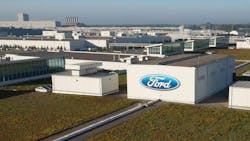Ford Delays Tennessee Truck, Ditches Plan For Three-Row Electric SUV
The leaders of Ford Motor Co. have pulled the plug on plans to make a three-row electric sport utility vehicle and pushed back the timeline for its next-generation electric truck by at least 18 months.
In their Aug. 21 announcement, President and CEO Jim Farley and CFO John Lawler said those plans—along with other moves to relocate some battery production—fit with their goal of having future EV models reach profitability within 12 months of coming to market. That strategy is leaning heavily on big cost and capital spending cuts as well as a “skunkworks” team based in California that is re-imagining much of the design and construction of Ford vehicles.
“Today’s electric vehicle consumers are more cost-conscious than early adopters,” the executives said in a statement. “This, coupled with scores of new electric vehicle choices hitting the market over the next 12 months and rising compliance requirements, has amplified pricing pressures. These dynamics underscore the necessity of a globally competitive cost structure while being selective about customer and product segments.”
Specifically, Ford will, among other things:
- Move forward with the development of a three-row SUV that uses a hybrid propulsion system rather than being fully electric. The company had initially planned to start building the EV versions in Ontario in 2025 but this spring pushed back that timeline to 2027. Spiking the all-electric plan means Ford will write down about $400 million worth of manufacturing assets and Farley and Lawler expect to spend another $1.5 billion to make the switch to hybrids.
- Begin building an electric commercial van at its Ohio Assembly Plant near Cleveland plant in 2026. That plan is designed to take part of its profitable Ford Pro platform for businesses, which sells software and various services along with the vehicles themselves.
- Delay until the second half of 2027—from the previous target date of 2025—production of the company’s next-generation truck, codenamed Project T3. Farley and Lawler said pushing back work on that vehicle, which will be manufactured at Ford’s new BlueOval City campus in West Tennessee, will let them work in cheaper batteries and “other cost breakthroughs while the market continues to develop.”
- Relocate some Mustang Mach-E battery production from Poland to Western Michigan so that the parts qualify for tax credits under the Inflation Reduction Act.
Other Ford Headlines From 2024
February 7 - Ford’s Farley: Next-Gen EVs Will Need to Turn Profit In First Year
March 26 - Ford CFO: Cheaper EVs Will Be ‘First Inflection Point’
June 19 - Ford CEO on Clearer EV Priorities, Supplier Changes and a ‘New Global Standard of Fitness’
Shares of Ford (Ticker: F) rose nearly 2% to $10.85 Aug. 21. They are, however, still well below the nearly $14 at which they traded prior to Farley and Lawler reporting the company’s second-quarter results late last month. Over the past six months, they are down about 10%, leaving the company’s market capitalization at about $43 billion.
About the Author
Geert De Lombaerde
Senior Editor
A native of Belgium, Geert De Lombaerde has been in business journalism since the mid-1990s and writes about public companies, markets and economic trends for Endeavor Business Media publications, focusing on IndustryWeek, FleetOwner, Oil & Gas Journal, T&D World and Healthcare Innovation. He also curates the twice-monthly Market Moves Strategy newsletter that showcases Endeavor stories on strategy, leadership and investment and contributes to other Market Moves newsletters.
With a degree in journalism from the University of Missouri, he began his reporting career at the Business Courier in Cincinnati in 1997, initially covering retail and the courts before shifting to banking, insurance and investing. He later was managing editor and editor of the Nashville Business Journal before being named editor of the Nashville Post in early 2008. He led a team that helped grow the Post's online traffic more than fivefold before joining Endeavor in September 2021.
